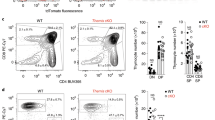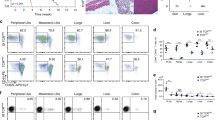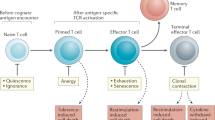Abstract
T cell receptor (TCR) signaling triggered by recognition of self-major histocompatibility complex (MHC) ligands has been proposed to maintain the viability of naïve T cells and to provoke their proliferation in T cell–deficient hosts. Consistent with this, the partially phosphorylated state of TCRζ chains in naïve CD4+ and CD8+ T cells in vivo was found to be actively maintained by TCR interactions with specific peptide-containing MHC molecules. TCR ligand-dependent phosphorylation of TCRζ was lost within one day of cell transfer into MHC-deficient hosts, yet the survival of transferred CD4+ lymphocytes was the same in recipients with or without MHC class II expression for one month. Thus, despite clear evidence for TCR signaling in nonactivated naïve T cells, these data argue against the concept that such signaling plays a predominant role in determining lymphocyte lifespan.
This is a preview of subscription content, access via your institution
Access options
Subscribe to this journal
Receive 12 print issues and online access
$209.00 per year
only $17.42 per issue
Buy this article
- Purchase on Springer Link
- Instant access to full article PDF
Prices may be subject to local taxes which are calculated during checkout





Similar content being viewed by others
References
Pircher, H., Rohrer, U. H., Moskophidis, D., Zinkernagel, R. M. & Hengartner, H. Lower receptor avidity required for thymic clonal deletion than for effector T-cell function. Nature 351, 482–485 (1991).
Smyth, L. A. et al. Altered peptide ligands induce quantitatively but not qualitatively different intracellular signals in primary thymocytes. Proc. Natl Acad. Sci. USA 95, 8193–8198 (1998).
Davey, G. M. et al. Preselection thymocytes are more sensitive to T cell receptor stimulation than mature T cells. J. Exp. Med. 188, 1867–1874 (1998).
Lucas, B., Štefanová, I., Yasutomo, K., Dautigny, N. & Germain, R. N. Divergent changes in the sensitivity of maturing T cells to structurally related ligands underlies formation of a useful T cell repertoire. Immunity 10, 367–376 (1999).
Peterson, D. A., DiPaolo, R. J., Kanagawa, O. & Unanue, E. R. Negative selection of immature thymocytes by a few peptide-MHC complexes: differential sensitivity of immature and mature T cells. J. Immunol. 162, 3117–3120 (1999).
Takeda, S., Rodewald, H. R., Arakawa, H., Bluethmann, H. & Shimizu, T. MHC class II molecules are not required for survival of newly generated CD4+ T cells, but affect their long-term life span. Immunity 5, 217–228 (1996).
Tanchot, C., Lemonnier, F. A., Perarnau, B., Freitas, A. A. & Rocha, B. Differential requirements for survival and proliferation of CD8 naive or memory T cells. Science 276, 2057–2062 (1997).
Rooke, R., Waltzinger, C., Benoist, C. & Mathis, D. Targeted complementation of MHC class II deficiency by intrathymic delivery of recombinant adenoviruses. Immunity 7, 123–134 (1997).
Brocker, T. Survival of mature CD4 T lymphocytes is dependent on major histocompatibility complex class II-expressing dendritic cells. J. Exp. Med. 186, 1223–1232 (1997).
Kirberg, J., Berns, A. & von Boehmer, H. Peripheral T cell survival requires continual ligation of the T cell receptor to major histocompatibility complex-encoded molecules. J. Exp. Med. 186, 1269–1275 (1997).
Markiewicz, M.A. et al. Long-term T cell memory requires the surface expression of self-peptide/major histocompatibility complex molecules. Proc. Natl Acad. Sci. USA 95, 3065–3070 (1998).
Viret, C., Wong, F. S. & Janeway, C. A. Jr. Designing and maintaining the mature TCR repertoire: the continuum of self-peptide:self-MHC complex recognition. Immunity 10, 559–568 (1999).
Witherden, D. et al. Tetracycline-controllable selection of CD4+ T cells. Half-life and survival signals in the absence of major histocompatibility complex class II molecules. J. Exp. Med. 191, 355–364 (2000).
Beutner, U. & MacDonald, H. R. TCR-MHC class II interaction is required for peripheral expansion of CD4 cells in a T cell-deficient host. Int. Immunol. 10, 305–310 (1998).
Oehen, S. & Brduscha-Riem, K. Naive cytotoxic T lymphocytes spontaneously acquire effector function in lymphocytopenic recipients: a pitfall for T cell memory studies? Eur. J. Immunol. 29, 608–614 (1999).
Bender, J., Mitchell, T., Kappler, J. & Marrack, P. CD4+ T cell division in irradiated mice requires peptides distinct from those responsible for thymic selection. J. Exp. Med. 190, 367–373 (1999).
Ernst, B., Lee, D. S., Chang, J. M., Sprent, J. & Surh, C. D. The peptide ligands mediating positive selection in the thymus control T cell survival and homeostatic proliferation in the periphery. Immunity 11, 173–181 (1999).
Goldrath, A. W. & Bevan, M. J. Low-affinity ligands for the TCR drive proliferation of mature CD8+ T cells in lymphopenic hosts. Immunity 11, 183–190 (1999).
Kieper, W. C. & Jameson, S. C. Homeostatic expansion and phenotypic conversion of naive T cells in response to self peptide/MHC ligands. Proc. Natl Acad. Sci. USA 96, 13306–13311 (1999).
Murali-Krishna, K. et al. Persistence of memory CD8 T cells in MHC class I-deficient mice. Science 286, 1377–1381 (1999).
Muranski, P., Chmielowski, B. & Ignatowicz, L. Mature CD4+ T cells perceive a positively selecting class II MHC/peptide complex in the periphery. J. Immunol. 164, 3087–3094 (2000).
van Oers, N. S. et al. Constitutive tyrosine phosphorylation of the T-cell receptor (TCR) ζ subunit: regulation of TCR-associated protein tyrosine kinase activity by TCR ζ. Mol. Cell. Biol. 13, 5771–5780 (1993).
van Oers, N.S., Killeen, N. & Weiss, A. ZAP-70 is constitutively associated with tyrosine-phosphorylated TCR ζ in murine thymocytes and lymph node T cells. Immunity 1, 675–685 (1994).
Sloan-Lancaster, J., Shaw, A. S., Rothbard, J. B. & Allen, P. M. Partial T cell signaling: altered phospho-ζ and lack of Zap70 recruitment in APL-induced T cell anergy. Cell 79, 913–922 (1994).
Madrenas, J. et al. phosphorylation without ZAP-70 activation induced by TCR antagonists or partial agonists. Science 267, 515–518 (1995).
Dutton, R. W., Bradley, L. M. & Swain, S. L. T cell memory. Annu. Rev. Immunol. 16, 201–223 (1998).
Rocha, B. & von Boehmer, H. Peripheral selection of the T cell repertoire. Science 251, 1225–1228 (1991).
Saparov, A. et al. Memory/effector T cells in TCR transgenic mice develop via recognition of enteric antigens by a second, endogenous TCR. Int. Immunol. 11, 1253–1264 (1999).
Ardouin, L. et al. Crippling of CD3-ζ ITAMs does not impair T cell receptor signaling. Immunity 10, 409–420 (1999).
Shores, E. W. et al. Role of the multiple T cell receptor (TCR)-ζ chain signaling motifs in selection of the T cell repertoire. J. Exp. Med. 185, 893–900 (1997).
Mackall, C. L., Hakim, F. T. & Gress, R. E. Restoration of T-cell homeostasis after T-cell depletion. Semin. Immunol. 9, 339–346 (1997).
Wilkinson, R. W., Anderson, G., Owen, J. J. & Jenkinson, E. J. Positive selection of thymocytes involves sustained interactions with the thymic microenvironment. J. Immunol. 155, 5234–5240 (1995).
Kisielow, P. & Miazek, A. Positive selection of T cells: rescue from programmed cell death and differentiation require continual engagement of the T cell receptor. J. Exp. Med. 181, 1975–1984 (1995).
Schmitt, S., Muller, K. P. & Kyewski, B. A. Two separable T cell receptor signals reconstitute positive selection of CD4 lineage T cells in vivo. Eur. J. Immunol. 27, 2139–2144 (1997).
Yasutomo, K., Lucas, B. & Germain, R. N. TCR signaling for initiation and completion of thymocyte positive selection has distinct requirements for ligand quality and presenting cell type. J. Immunol., in press (2000).
Miyazaki, T. et al. Mice lacking H2-M complexes, enigmatic elements of the MHC class II peptide-loading pathway. Cell 84, 531–541 (1996).
Martin, W.D. et al. H2-M mutant mice are defective in the peptide loading of class II molecules, antigen presentation, and T cell repertoire selection. Cell 84, 543–550 (1996).
Nakayama, T., Singer, A., Hsi, E. D. & Samelson, L. E. Intrathymic signaling in immature CD4+CD8+ thymocytes results in tyrosine phosphorylation of the T-cell receptor ζ chain. Nature 341, 651–654 (1989).
Robey, E. & Fowlkes, B. J. Selective events in T cell development. Annu. Rev. Immunol. 12, 675–705 (1994).
Riberdy, J. M., Mostaghel, E. & Doyle, C. Disruption of the CD4-major histocompatibility complex class II interaction blocks the development of CD4+ T cells in vivo. Proc. Natl Acad. Sci. USA 95, 4493–4498 (1998).
Mostaghel, E. A., Riberdy, J. M., Steeber, D. A. & Doyle, C. Coreceptor-independent T cell activation in mice expressing MHC class II molecules mutated in the CD4 binding domain. J. Immunol. 161, 6559–6566 (1998).
König, R., Huang, L. Y. & Germain, R. N. MHC class II interaction with CD4 mediated by a region analogous to the MHC class I binding site for CD8. Nature 356, 796–798 (1992).
Cosgrove, D. et al. Mice lacking MHC class II molecules. Cell 66, 1051–1066 (1991).
Clarke, S. R. & Rudensky, A. Y. Survival and homeostatic proliferation of naive peripheral CD4+ T cells in the absence of self peptide:MHC complexes. J. Immunol. 165, 2458–2464 (2000).
Tanchot, C. & Rocha, B. Peripheral selection of T cell repertoires: the role of continuous thymus output. J. Exp. Med. 186, 1099–1106 (1997).
Pestano, G.A. et al. Inactivation of misselected CD8 T cells by CD8 gene methylation and cell death. Science 284, 1187–1191 (1999).
Ljunggren, H. G., Van Kaer, L., Ashton-Rickardt, P. G., Tonegawa, S. & Ploegh, H. L. Differential reactivity of residual CD8+ T lymphocytes in TAP1 and β2-microglobulin mutant mice. Eur. J. Immunol. 25, 174–178 (1995).
Ljunggren, H. G., Glas, R., Sandberg, J. K. & Kärre, K. Reactivity and specificity of CD8+ T cells in mice with defects in the MHC class I antigen-presenting pathway. Immunol. Rev. 151, 123–148 (1996).
Petricoin, E. F. et al. Antiproliferative action of interferon-α requires components of T- cell-receptor signalling. Nature 390, 629–632 (1997).
Lee, I. H., Li, W. P., Hisert, K. B. & Ivashkiv, L. B. Inhibition of interleukin 2 signaling and signal transducer and activator of transcription (STAT)5 activation during T cell receptor- mediated feedback inhibition of T cell expansion. J. Exp. Med. 190, 1263–1274 (1999).
Mary, F. et al. Modulation of TCR signaling by beta1 integrins: role of the tyrosine phosphatase SHP-1. Eur. J. Immunol. 29, 3887–3897 (1999).
Germain, R. N. & Štefanová, I. The dynamics of T cell receptor signaling: complex orchestration and the key roles of tempo and cooperation. Annu. Rev. Immunol. 17, 467–522 (1999).
Marrack, P. et al. Homeostasis of αβ TCR+ T cells. Nature Immunol. 1, 107–111 (2000).
Grossman, Z. & Paul, W. E. Adaptive cellular interactions in the immune system: the tunable activation threshold and the significance of subthreshold responses. Proc. Natl Acad. Sci. USA 89, 10365–10369 (1992).
Kersh, B. E., Kersh, G. J. & Allen, P. M. Partially phosphorylated T cell receptor ζ molecules can inhibit T cell activation. J. Exp. Med. 190, 1627–1636 (1999).
Zijlstra, M. et al. β2-microglobulin deficient mice lack CD4−8+ cytolytic T cells. Nature 344, 742–746 (1990).
Van Kaer, L., Ashton-Rickardt, P. G., Ploegh, H. L. & Tonegawa, S. TAP1 mutant mice are deficient in antigen presentation, surface class I molecules, and CD4-8+ T cells. Cell 71, 1205–1214 (1992).
Shinkai, Y. et al. RAG-2-deficient mice lack mature lymphocytes owing to inability to initiate V(D)J rearrangement. Cell 68, 855–867 (1992).
Kaye, J. et al. Selective development of CD4+ T cells in transgenic mice expressing a class II MHC-restricted antigen receptor. Nature 341, 746–749 (1989).
Kisielow, P., Bluthmann, H., Staerz, U. D., Steinmetz, M. & von Boehmer, H. Tolerance in T-cell-receptor transgenic mice involves deletion of nonmature CD4+8+ thymocytes. Nature 333, 742–746 (1988).
Pircher, H., Burki, K., Lang, R., Hengartner, H. & Zinkernagel, R. M. Tolerance induction in double specific T-cell receptor transgenic mice varies with antigen. Nature 342, 559–561 (1989).
Seder, R. A., Paul, W. E., Davis, M. M. & Fazekas de St. Groth, B. The presence of interleukin 4 during in vitro priming determines the lymphokine-producing potential of CD4+ T cells from T cell receptor transgenic mice. J. Exp. Med. 176, 1091–1098 (1992).
Štefanová, I. et al. Lipopolysaccharide induces activation of CD14-associated protein tyrosine kinase p53/56lyn. J. Biol. Chem. 268, 20725–20728 (1993).
Burkhardt, A. L. et al. Temporal regulation of non-transmembrane protein tyrosine kinase enzyme activity following T cell antigen receptor engagement. J. Biol. Chem. 269, 23642–23647 (1994).
Acknowledgements
We thank R. Swofford, C. Eigsti and D. Stephany of the NIAID Flow Cytometry Facility for cell sorting; A. Fox for technical assistance; D. Raulet, P. Schwartzberg, P. Love, J. Delon, A. Porgador and C. Broussard for discussions and reading the manuscript; B. Rocha, R. Schwartz, B. J. Fowlkes and members of the Germain lab for helpful discussion; C. Doyle, J. Riberdy, L. Van Kaer and E. Bikoff for mice; J. Bolen, A. Iwasaki and B. Kelsall for reagents; and G. Asfaw, F. Bishop and C. Callahan for assistance with typing mice.
Author information
Authors and Affiliations
Corresponding author
Rights and permissions
About this article
Cite this article
Dorfman, J., Štefanová, I., Yasutomo, K. et al. CD4+ T cell survival is not directly linked to self-MHC–induced TCR signaling. Nat Immunol 1, 329–335 (2000). https://doi.org/10.1038/79783
Received:
Accepted:
Issue Date:
DOI: https://doi.org/10.1038/79783
This article is cited by
-
Molecular mechanisms of physiological change under acute total dissolved gas supersaturation stress in yellow catfish (Pelteobagrus fulvidraco)
Environmental Science and Pollution Research (2023)
-
Phosphoinositides regulate the TCR/CD3 complex membrane dynamics and activation
Scientific Reports (2018)
-
The TCR's sensitivity to self peptide–MHC dictates the ability of naive CD8+ T cells to respond to foreign antigens
Nature Immunology (2015)
-
The self-obsession of T cells: how TCR signaling thresholds affect fate 'decisions' and effector function
Nature Immunology (2014)
-
Insights into the initiation of TCR signaling
Nature Immunology (2014)



